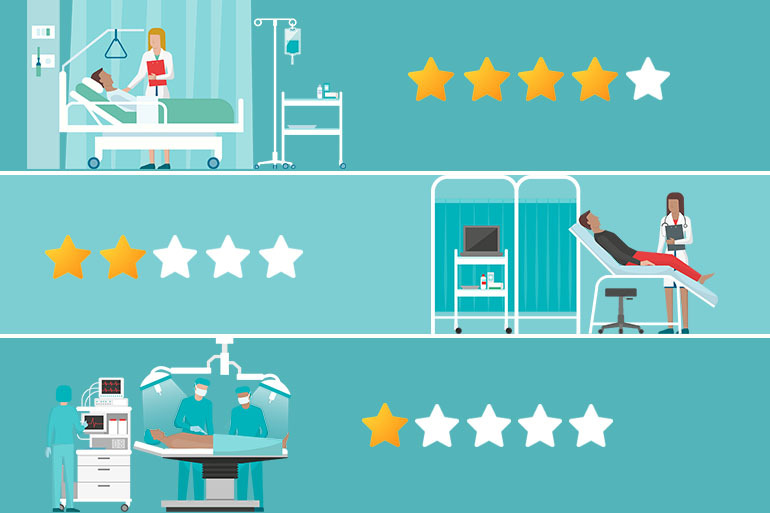The federal government released its first overall hospital quality rating on Wednesday, slapping average scores on some of California’s best-known medical centers while awarding top scores to unheralded ones.
The Centers for Medicare & Medicaid Services rated 3,617 hospitals nationwide on a one- to five-star scale, angering the hospital industry, which has been pressing the Obama administration and Congress to block the ratings. Hospitals argue the ratings will make places that treat the toughest cases look bad, but Medicare has held firm, saying that consumers need a simple way to objectively gauge quality. Medicare does factor in the health of patients when comparing hospitals, though not as much as some hospitals would like.
Just 102 hospitals received the top rating of five stars, nine in California. They include two Scripps Health Hospitals in La Jolla and two hospitals in Santa Barbara, as well as one each in Monterey, Irvine, Santa Cruz, Fresno and Arcadia.
Nationally, few of the top-rated hospitals are considered the nation’s best by private ratings sources such as U.S. News & World Report or viewed as the most elite within the medical profession. There were more five-star hospitals in Lincoln, Neb., and La Jolla, than in New York City or Boston. Memorial Hermann Hospital System in Houston and Mayo Clinic in Rochester, Minn., were two of the only nationally known hospitals to get five stars.
Medicare awarded the lowest rating of one star to 129 hospitals, including 11 in California.
Some large medical centers received the second highest rating of four stars, including Stanford Health Care, California Pacific Medical Center’s Pacific Campus in San Francisco and Cedars-Sinai Medical Center in Los Angeles. Nationally, 927 hospitals received four stars, including 48 in California.
Medicare gave its below average score of two-star ratings to 707 hospitals, including 86 in California.
Nearly half the hospitals — 1,752, including 145 in California — received an average rating of three stars. They include respected academic medical centers such as UCSF in San Francisco, UC San Diego, UC Davis, as well as Keck Hospital of USC and Ronald Reagan UCLA Medical Center, both in Los Angeles.
Another 1,042 hospitals were not rated, either because they did not have enough cases for the government to evaluate accurately, or, as with all Maryland hospitals, Medicare does not collect the necessary data.
Medicare based the star ratings on 64 individual measures that are published on its Hospital Compare website, including death and infection rates as well as patient reviews. Medicare noted that specialized and “cutting-edge care,” such as the latest techniques to battle cancer, are not reflected in the ratings.
Dr. Kate Goodrich, who oversees Medicare’s quality ratings, said in a statement that it has been using the same type of rating system for other medical facilities, such as nursing homes and dialysis centers, and found them useful to consumers and patients. Those ratings have shown, she said, “that publicly available data drives improvement, better reporting, and more open access to quality information for our Medicare beneficiaries.”
In a statement, Rick Pollack, president of the American Hospital Association, called the new ratings confusing for patients and families.
“Health care consumers making critical decisions about their care cannot be expected to rely on a rating system that raises far more questions than answers,” he said. “We are especially troubled that the current ratings scheme unfairly penalizes teaching hospitals and those serving higher numbers of the poor.”
A preliminary analysis Medicare released last week found hospitals that treated large numbers of low-income patients tended to do worse. Medicare does not consider patients’ social and financial situations in rating hospitals.
A sizable proportion of the nation’s major academic medical centers, which train doctors, scored poorly, according to a Kaiser Health News analysis.
Out of 288 hospitals that teach significant numbers of medical residents, six in 10 received below average scores, the analysis found. Teaching hospitals comprised a third of those getting one star. A number were in high poverty areas, including two in Newark, New Jersey, and three in Detroit.
“Hospitals cannot be rated like movies,” Dr. Darrell Kirch, president of the Association of American Medical Colleges, said in a statement. “We are extremely concerned about the potential consequences for patients that could result from portraying an overly simplistic picture of hospital quality with a star-rating system that combines many complex factors and ignores the socio-demographic factors that have a real impact on health.”
This story was produced by Kaiser Health News, an editorially independent program of the Kaiser Family Foundation.


